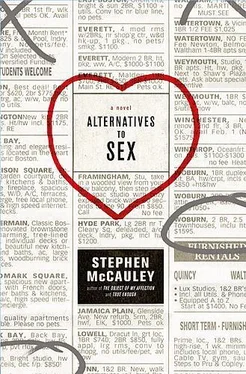“He’s not looking aggressively,” the woman put in. “He’s looking passive-aggressively.” She pursed her lips, and then smiled, erasing the hostility of the comment.
“Anyplace in particular that caught your eye out there?” I asked.
“The three-bedroom on Avon Hill. The ‘Manhattan-style’ layout?”
She put an ironic spin on this last part, a jab at the silly description of the apartment that, it so happens, I had written.
About ten years earlier, I’d been hired by the owner of Cambridge Properties to write the copy they use in their listings. It was a part-time project I took on to fill a few hours per week after leaving (on the advice of my eight-session therapist) a lucrative but debilitating position at a Boston advertising firm. One thing had led to another, and within a short while, I’d earned my license and was selling. Real estate was, in my case, less lucrative than advertising, but it was also less soul-numbing because you’re at least selling people something they need—shelter—even if at vastly inflated prices.
It didn’t take me long to realize that the key to writing successful listings is to describe everything in relation to something it isn’t: a Manhattan-style layout in a Cambridge apartment; a country kitchen in a downtown condominium; in-town convenience for a suburban ranch. It appeals to the basic human desire to have everything at once and nothing for too long. (“Great resale potential!”) And also, it tricks people into believing that their lives are a little better or more exciting or glamorous than they really are.
As I led them back to my desk, we made our introductions: William Collins, Sam Thompson, Charlotte O’Malley. They told me they had a house in Nahant, a rocky peninsula that sticks out into the ocean north of Boston. It was one of those anomalous scraps of Northeast coastline, a fragment of Maine dragged down on a glacier a few million years ago. Far enough away from urban noise and congestion to be desirable as a summer retreat, but close enough to downtown to be within easy year-round commuting distance and to have views of the city skyline.
Oddly enough, the best way to convince someone to move to a new locale is to praise the place they’re trying to leave. “I’ve heard it’s beautiful out there,” I said.
Samuel lit up at this. “It’s spectacular,” he said. “Views, ocean breezes, incredible sunsets. Really fabulous.” He swept a graceful hand—long fingers with a wedding ring floating loosely on one—through the air, setting the scene for me. It was an unnecessarily theatrical gesture that, along with use of the word “fabulous,” made me suspect he knew I was gay. I have a theory that heterosexuals use the word “fabulous” more frequently when in the company of gay men but I had no way of testing out the theory. “It’s another world,” he added.
I nodded enthusiastically, even though “another world” usually turns out to be a euphemism for racially segregated.
“One of the reasons we’re thinking about leaving,” Charlotte said, studying the listing sheet for the Manhattan-style apartment, “is that it’s just too spectacular. Too fabulous. It’s so incredible, you feel like leaping from the rocks.” She made another little pout and went back to the sheet.
“Some of us,” Samuel said. “Not all of us.” He spoke in a cheerful, reassuring way, issuing his words through a big smile and showing off a set of teeth that had been whitened to the color of fresh snow.
“True. Some of us are happy all the time. Others of us not. Others of us sometimes forget to take our antidepressants and start to think about leaping from the rocks.” She looked at me and gave me an ironic smile that made me feel we were accomplices.
I was tempted to ask her what antidepressants she was taking. I was embarrassed by the fact that I wasn’t taking any mood-altering drugs myself—it seemed so arrogant not to be these days, and obviously I would have benefited—but it made me feel like part of the mainstream to discuss them. Nothing got people into a more open, animated mood than discussing their medication. For many of my friends, their relationship with their antidepressants was the central relationship in their lives. Healthier, probably, than a relationship with your iron, but more expensive. They reveled in describing the distinctive way this or that pill interacted with their unique chemistry, as if they were describing a virtue or a personal accomplishment. “She didn’t like Wellbutrin, but I’ve never had any problems with it. It’s not for everyone, but for me, it’s been wonderful.”
“I hear there are a lot of those in Nahant,” I said. “Rocks.”
“Millions.” Charlotte was scanning the listing sheet with the middle finger of an unmanicured hand. “Only one bathroom?”
“I’m afraid so. The building’s from the 1920s, when people apparently cared less about having lots of bathrooms.”
“We don’t care much, do we, Charlotte?” He put his hand on his wife’s thigh, a gesture so spontaneous and tender, I felt intrusive simply for having noticed it. He looked at me. “Our son started college this month, so it’s just the two of us.”
“We’ll care as soon as we have a guest. Especially if it’s Daniel. Last year at this time, I was convinced I’d risen above caring about two bathrooms. Now, to be honest, I’d love three.”
She had large dark eyes that had about them a look of exhaustion not uncommon among intelligent people who know themselves too well and are worn down by the acquaintance. Looking at the two of them together, you had to conclude that she was the brighter of the pair—more imaginative, even if less successful. Her light brown hair was gathered into a loose, droopy chignon with a few damp tendrils undone and stuck to her neck. She wasn’t thin—a nice contrast to her husband’s impeccable angularity—and there was something about the easy, sloppy way she was sitting that made me think she didn’t care all that much one way or the other. I guessed her to be at least a few years younger than her husband—mid-forties?—but I was getting increasingly bad at guessing anyone’s age, collateral damage from having lied so often about my own on the computer dating circuit. She appeared to be more tossed together than Samuel, as if she was too busy worrying and fretting to comb her hair in perfect rows.
They began debating the virtues of having several bathrooms versus having just one in a way that made me think neither really cared about this issue; each just wanted to have the final word.
Deirdre came back from the alley, trailing in with her a faint smell of cigarette smoke, just in time to hear Charlotte say to her husband, “You make a relevant but facile point.” She sat down at her desk and began banging at her keyboard a little too loudly.
Deirdre glanced over and rolled her eyes at me, scoffing at the unfairness of being subjected to yet another public display of domestic discord. There was something in the tone of their conversation that suggested they enjoyed having an audience. I didn’t mind. I had been part of a couple and knew how weirdly lonely it can get, and how, from time to time, you need someone to hear the trees falling in the forest.
“Why don’t we go look at the apartment?” I said. “Just to give you an idea of what’s out there. You have to start the search somewhere.”
They gazed at each other, silently conversing: Should we? Shouldn’t we?
“It’s right around the corner,” I said. “We can walk.”
It was still pouring when we stepped outside. My umbrella was one of those unreliable folding kind, and I couldn’t get it to open. Within a few seconds, the shoulders of my suit jacket—Prada, inappropriately dressy for that hour of the day, but since it had cost only $90 at the consignment shop, I considered it casual wear—were wet.
Читать дальше












